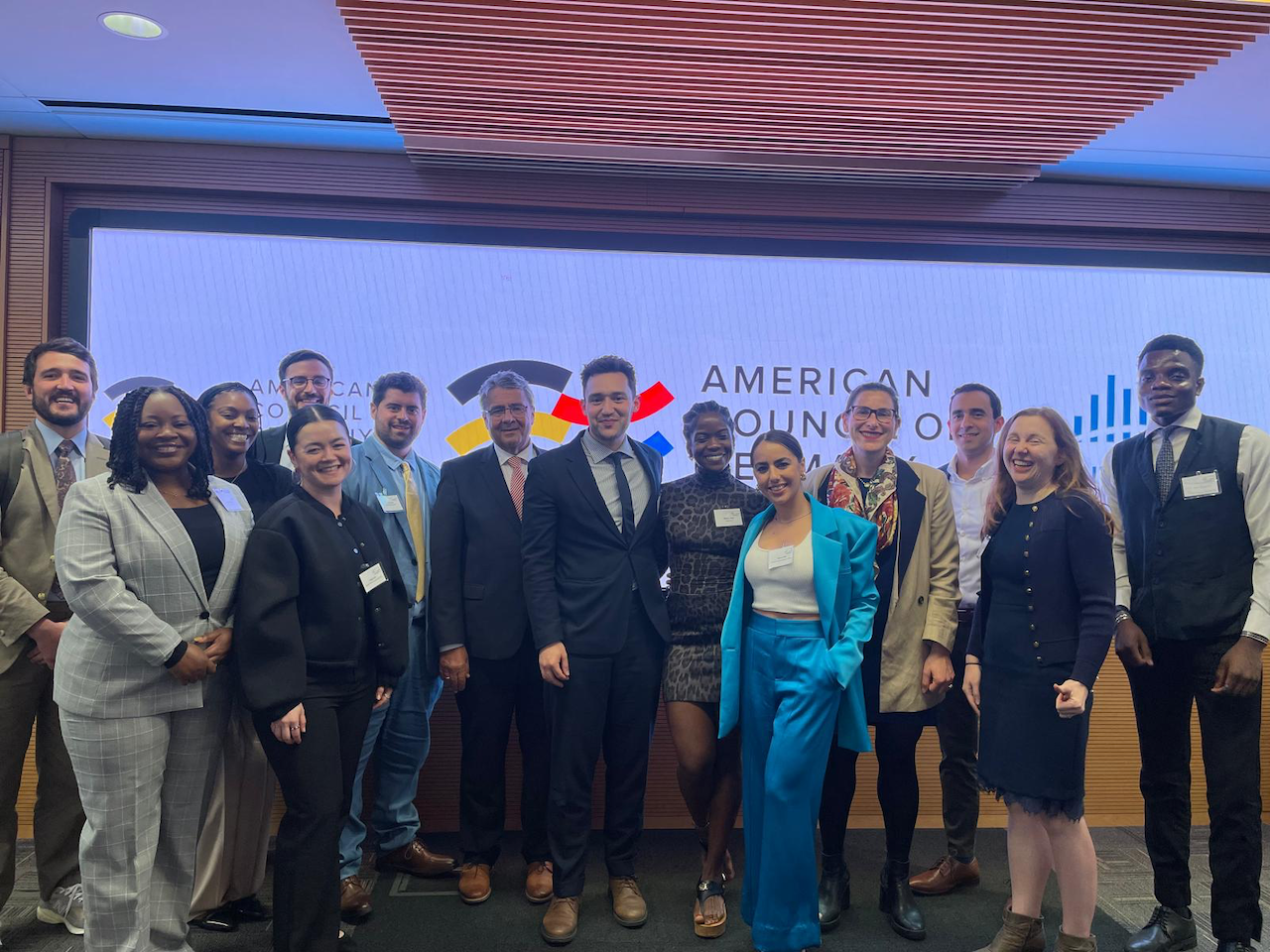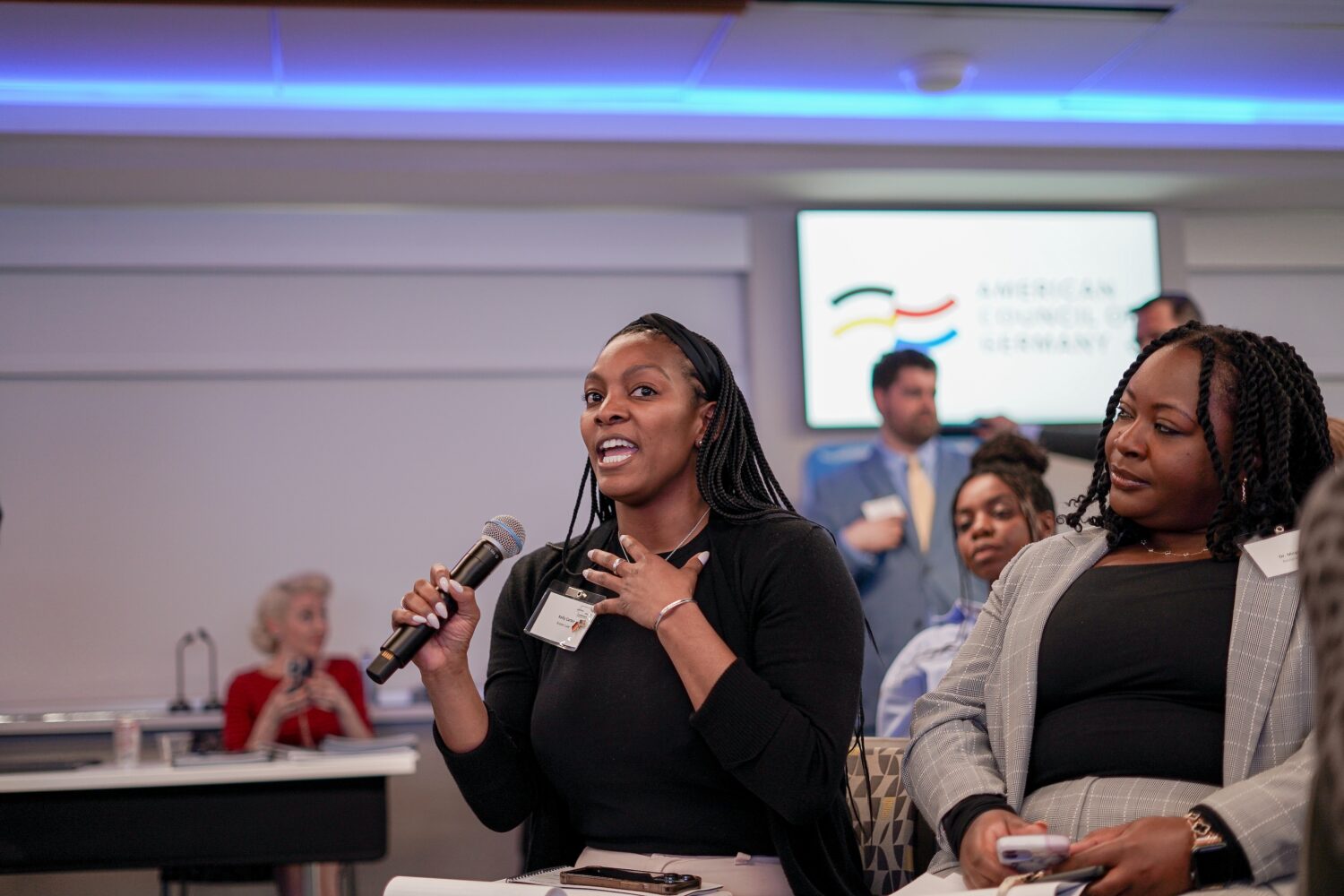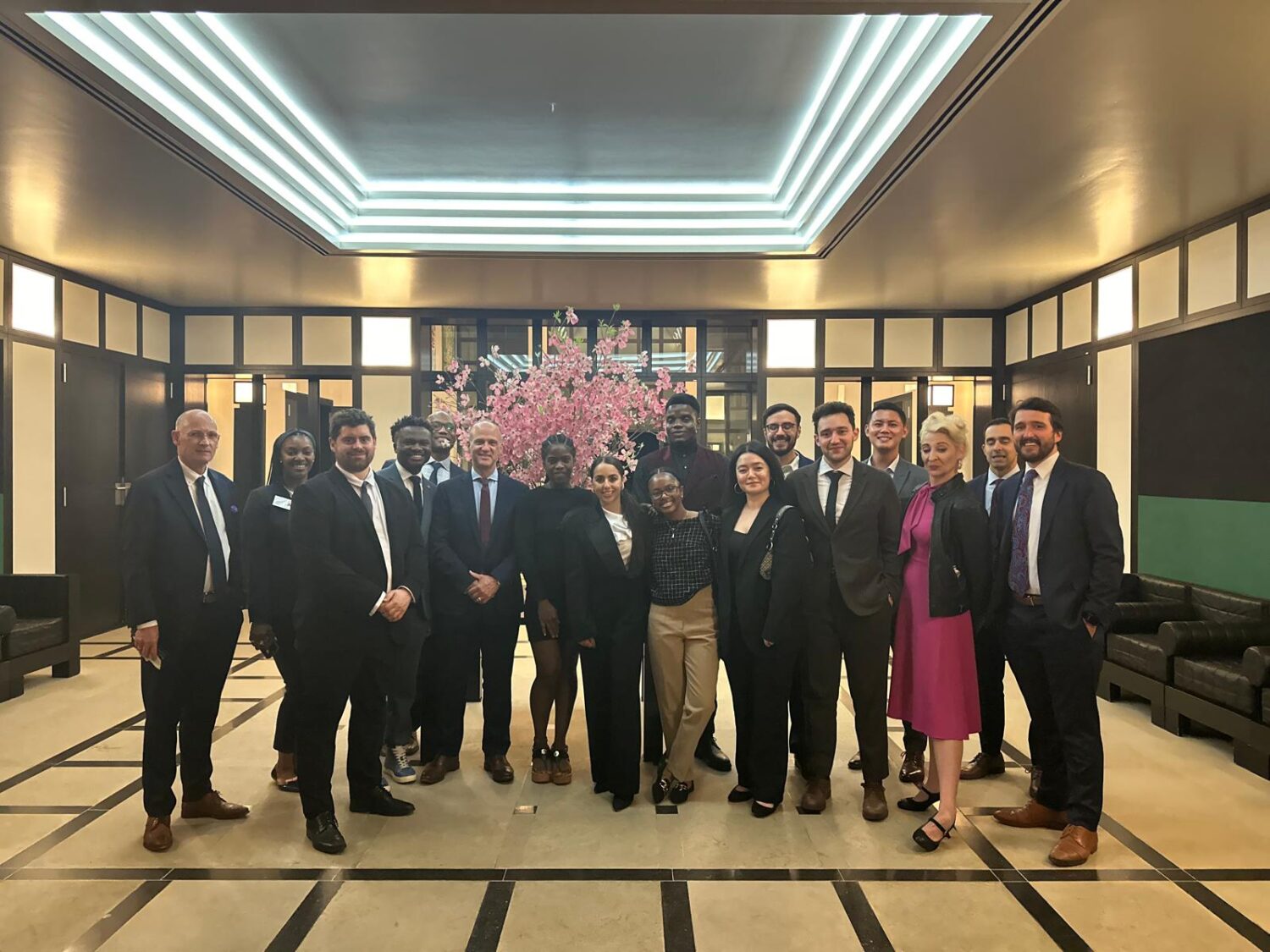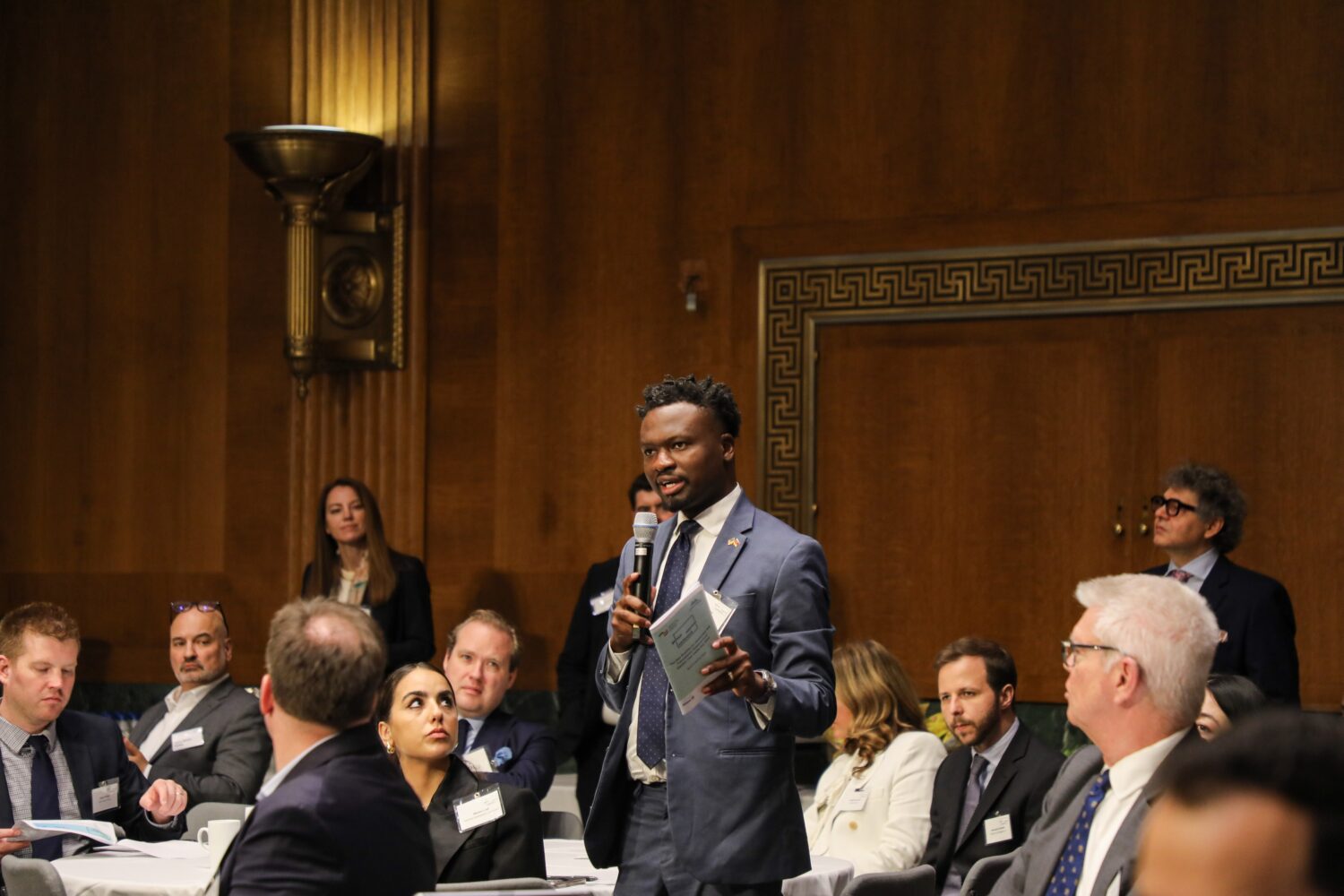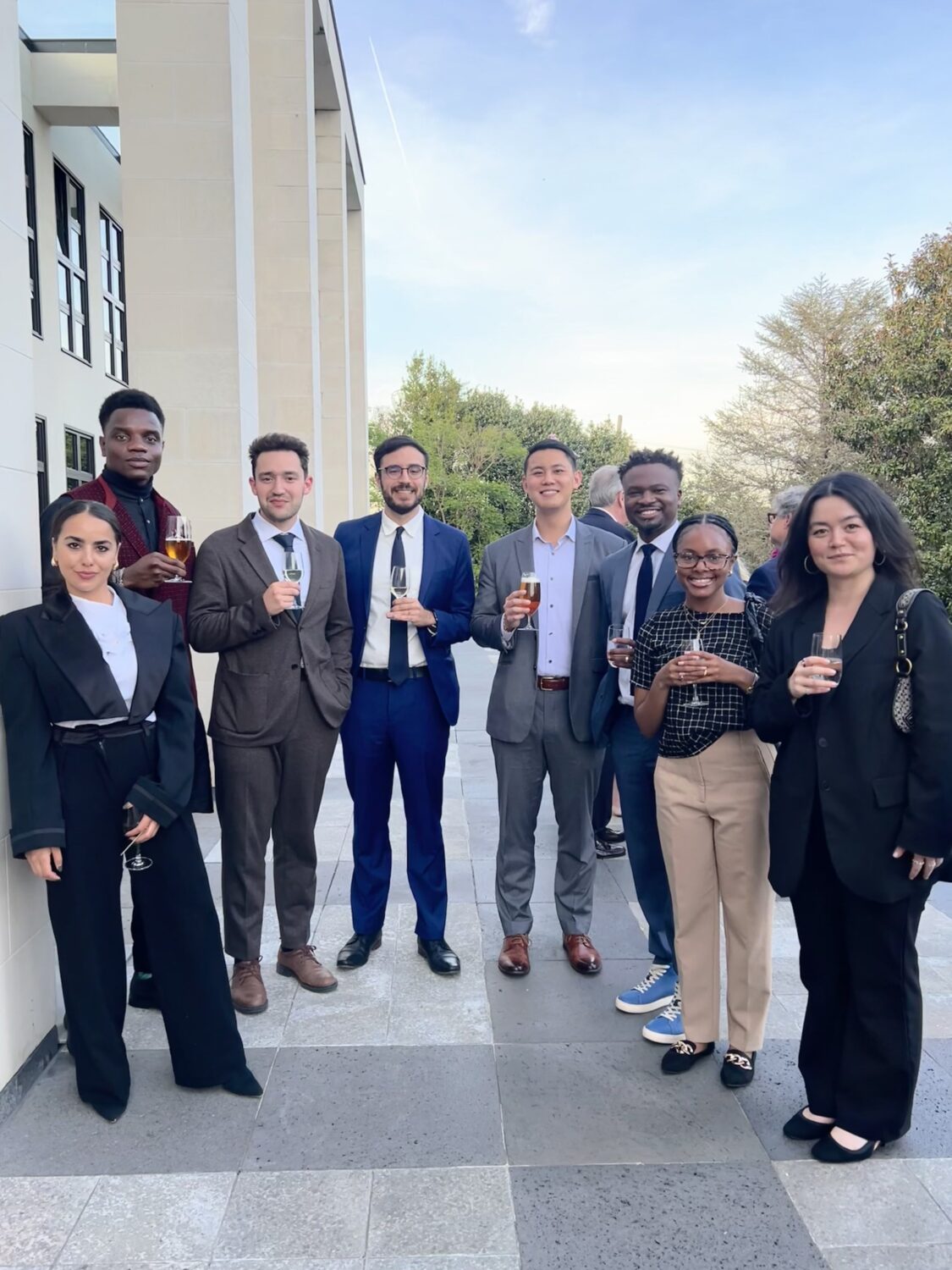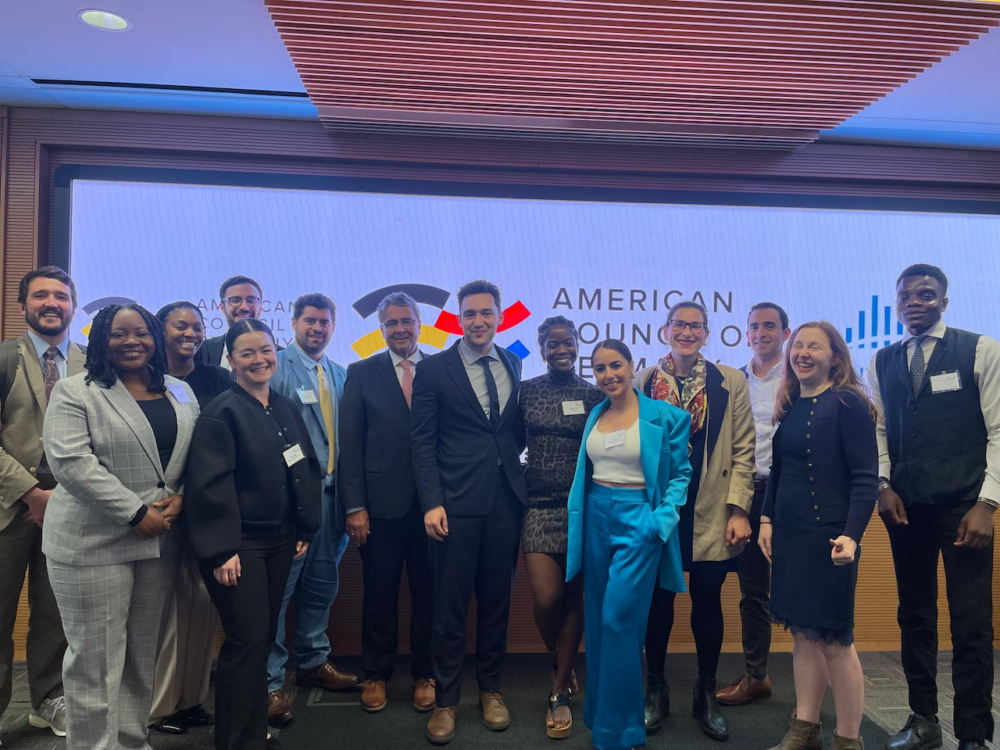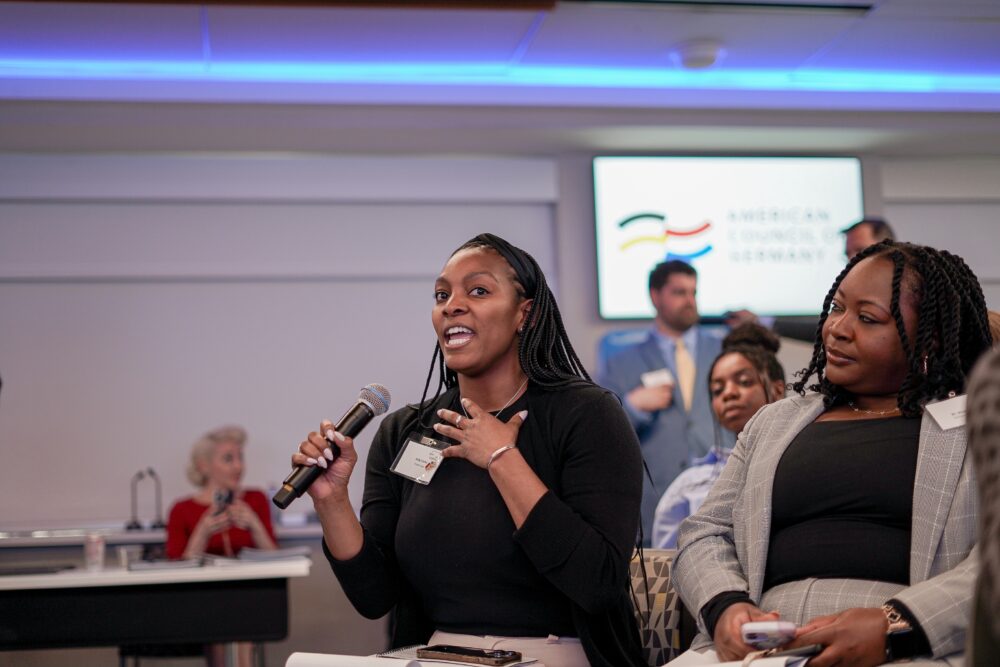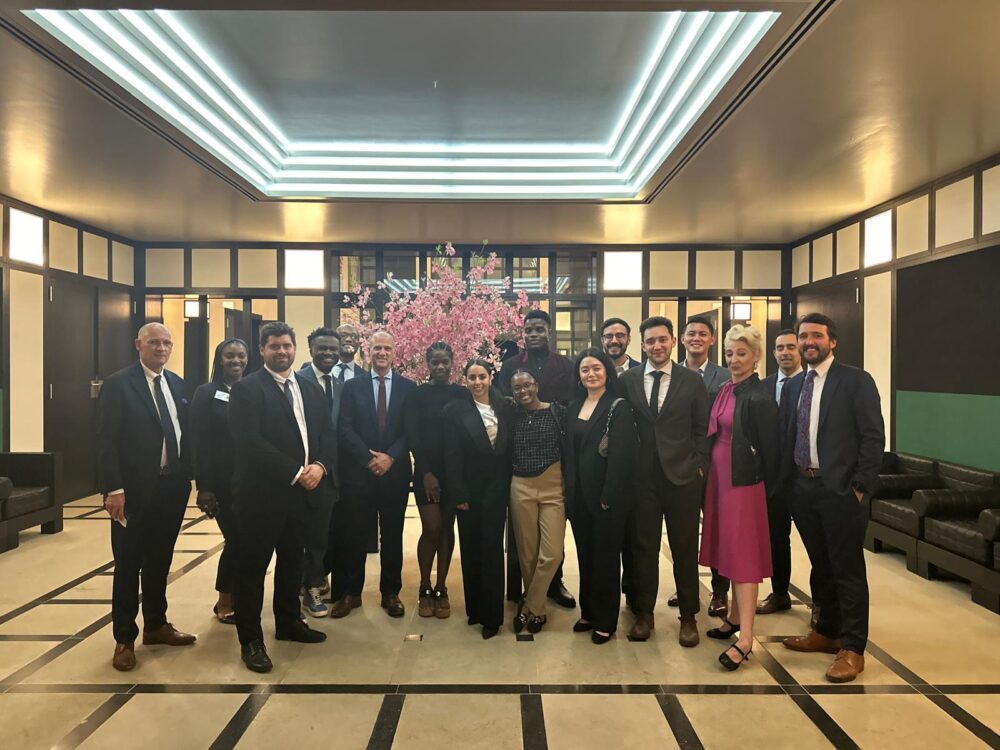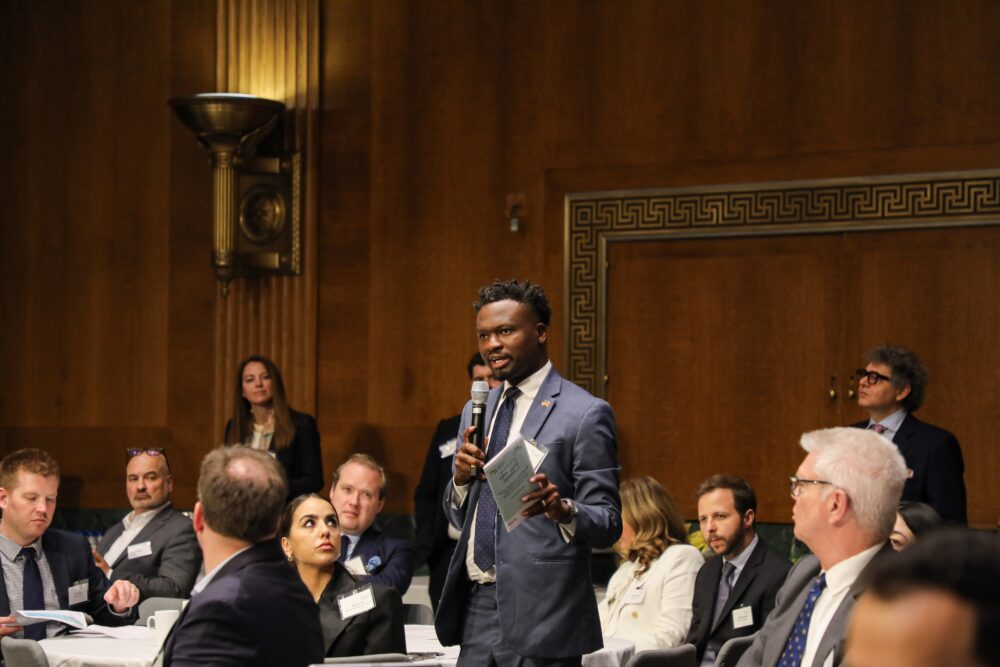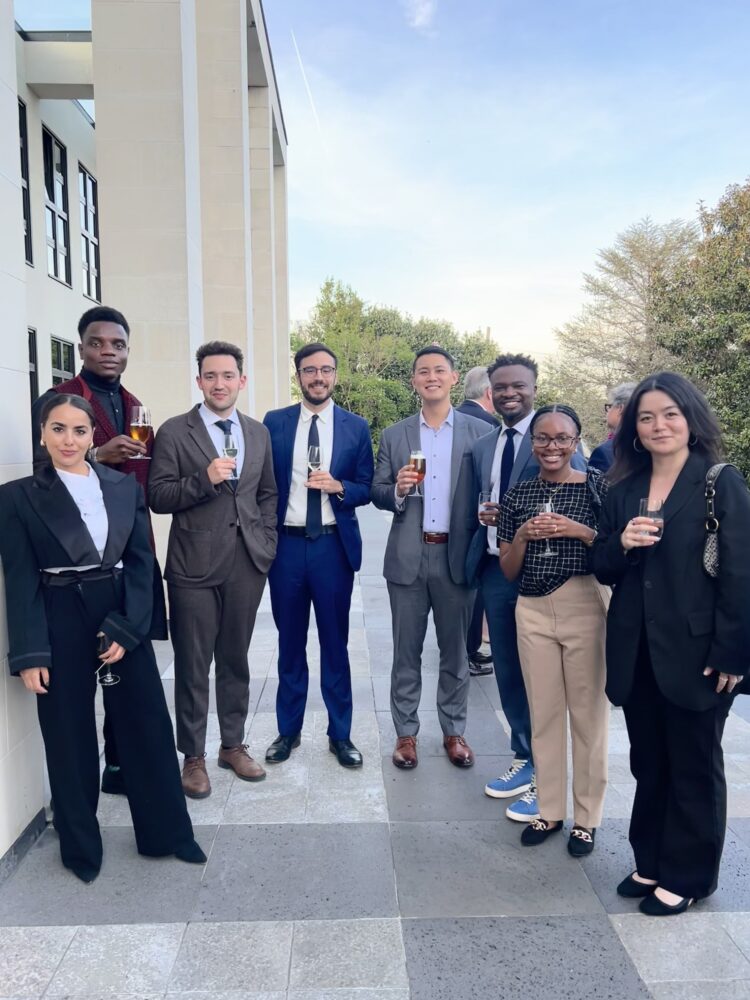The German-American Conference in Washington, D.C.: An In-Depth Analysis from a New Bridge Perspective
By Innokenty Burshteyn, Kelly Carter, Gerardo de la Garza, Rejoice Jones, Sanga Lenz, Megan Lowe, Roby Mercharles, Julian Pecora
With generous support fom the German Federal Foreign Office, Atlantik-Brücke was able to fund the participation of eight New Bridge alumni – six from the United States and two from Germany – in this year’s German-American Conference in Washington, D.C., on April 15 and 16. Organized by Atlantik-Brücke and the American Council on Germany, the conference focused on “The New Realities for Democracy and Transatlantic Relations in an Election Year Unlike Any Other.” This report reflects the unique experience of our New Bridge alumni.
In the historic corridors of the 2024 German-American Conference, a gathering defined by its focus on democracy’s present challenges and future sustainability, the conference entailed a series of pivotal discussions that spanned the breadth of the transatlantic geopolitical spectrum. Addressing the seismic shifts in political landscapes both in the United States and Europe, the conference sought to unravel the intricate tapestry of political, economic, and security challenges that define the contemporary global order. With a clear-eyed view towards the upcoming pivotal elections and their far-reaching implications, the sessions were designed to foster a deeper understanding and strategize responses that would strengthen the transatlantic alliance in times of profound change and uncertainty.
Global Elections and Where the Transatlantic World Fits in
The 2024 German-American Conference opened with a resounding call to action, setting the stage for discussions on the pressing challenges facing democracy in the transatlantic world. Participants focused on the significance of the „biggest election year in history,“ recognizing the urgency of safeguarding democratic values amidst global political turmoil.
A Fireside Chat featuring Senator Christopher Murphy and Sigmar Gabriel, Chairman of Atlantik-Brücke, kicked off the conference. Their dialogue delved into the fundamental principles underpinning the transatlantic partnership and the vital role played by both nations in promoting democracy globally.
“Trust in democratic institutions is so essential and fundamental. I’m confident that the commitment to freedom and democracy is still deeply entrenched in our societies on both sides of the Atlantic; much more entrenched than the divisions that we have come to believe are insurmountable. Polls in both the U.S. and Europe should clearly, with the overwhelming majorities, agree that the right to vote lies at the core of the country’s identity. It lies at the core of the transatlantic partnership.” Sigmar Gabriel, Chairman, Atlantik-Brücke
Subsequently, Matt Cunningham, Executive Vice President of Edelman Data & Intelligence, provided an insightful session on the state of trust within the transatlantic relationship, presenting survey results that depicted a concerning decline in trust among Germans about the partnership’s value. This session underscored the urgency of addressing key challenges and rebuilding confidence.
The role of the media in shaping global elections and perceptions of the transatlantic world was explored through a panel discussion with three media leaders: Allison Meakem, Associate Editor at Foreign Policy, Ines Pohl, Washington DC Bureau Chief at Deutsche Welle, and Dr. Majid Sattar, Washington Correspondent for the Frankfurter Allgemeine Zeitung. Their perspectives highlighted how the media landscape influences public discourse and political narratives, stressing the interconnectedness of information dissemination and democratic processes.
“What is the biggest motivator when voting during this American election cycle: hate, fear, or sanity?” Ines Pohl, Washington DC Bureau Chief at Deutsche Welle
As the day concluded, it became clear that the stakes are high in the upcoming elections across Europe and the United States, with complex drivers of political and social divisions demanding urgent attention. Participants left with a renewed commitment to confront these challenges by fostering dialogue and collaboration.
Elections in the U.S. and in Europe
The morning of Day Two at the 2024 German-American Conference provided a profound examination of the forthcoming elections in the U.S. and Europe, underscoring their significant international repercussions. The discussions were sparked by Ambassador John Emerson, who set the stage by articulating the changes in global dynamics post-Trump presidency, especially how these changes impact strategies around major conflicts such as the Russian invasion of Ukraine. This year’s election in the U.S., potentially seeing the return of Trump, could pivot the U.S. back towards isolationism, which might lessen pressure on adversaries like Russia and reshape U.S. commitments to international alliances.
The session titled „Political Polarization: What’s at Stake When the U.S. Votes?“ delved deeper into the ramifications of the U.S. presidential election, with panelists – Julia Ioffe, Founding Partner and Washington Correspondent of Puck Media, Matt Gorman, Vice President of Targeted Victory, and Jamieson Greer, Partner at Kind & Spalding – arguing that, while American voters often focus on domestic issues such as the economy, immigration, and cultural values, their choices have far-reaching consequences on international relations. These include NATO’s future, the architecture of global trade, and the general stability of international diplomacy. Discussions highlighted the nuanced ways in which internal U.S. policies on tariffs and trade agreements, particularly with countries like France, are scrutinized abroad and can lead to shifts in global economic policies.
Subsequently, the focus shifted to Europe in „What to Watch When Europe Votes?“ which explored the likely electoral gains of right-wing populism in European Parliament elections. Dr. Phyllis Berry, National Intelligence Officer for Europe at the National Intelligence Council, Christian Gaebel, Head of Agricultural and Support Policy at the Deutscher Bauernverband, Dr. Andrew Moravcsik, Professor of Politics and International Affairs at Princeton, and Julian Mueller-Kaler, Chief of Staff and Director of the Strategic Foresight Hub at the Stimson Center highlighted the growing disillusionment with traditional centrist politics, exacerbated by migration, economic instability, and cultural conflicts. This session examined how a shift to the right might affect Europe’s approach to international policy, including its agricultural policies and stance on geopolitical conflicts such as the Ukraine crisis. The insights offered a comprehensive look at how voter sentiment, driven by internal social and economic factors, is set to reshape Europe’s influence on the world stage.
“I wonder whether the differentiation between left and right is still an adequate term of what we are trying to describe. The Economist after the election of Donald Trump coined a new term of “drawbridge up” or “drawbridge down,” of those in favor of globalization and those against it, those thar have seen the benefits of a more integrated economy on a global scale and those that have not.“ Julian Mueller-Kaler, Chief of Staff and Director Strategic Foresight Hub, Stimson Center
Transatlantic Stability and Security
The second half of Day Two shifted the conference’s focus towards broader economic and security challenges impacting the transatlantic relationship. The panel on global economic futures – comprising of Dr. Andreas Dombret, Global Senior Advisor at Oliver Wyman, Claudia Donzelmann, Global Head of Regulatory and Public Affairs of Allianz SE, Dr. Christof Ehrhart, Executive Vice President of Corporate Communications and Governmental Affairs at Robert Bosch GmbH, Dr. John Lipsky, Senior Fellows at the Foreign Policy Institute at Johns Hopkins University School of Advanced International Studies, and Dr. Inu Manak, Fellows for Trade Policy at the Council on Foreign Relations – tackled the pressing issue of how recent pivotal events, including the COVID-19 pandemic and ongoing Russian aggression in Ukraine, have reshaped the distribution of economic power and resources globally. The dialogue was framed around the concept that economic growth needs to be sustainable and equitable to prevent societal conflicts over shrinking resources. Panelists debated the effectiveness of current global economic structures like the G20, criticizing its lack of legitimacy and adequacy in addressing contemporary challenges. There was a consensus on the need for a new, more inclusive decision-making body that could better represent the interests of a multipolar world.
“With one third of global GDP, the transatlantic relationship is incredibly essential for the global economy and for economic stability for the entire world; what we decide to work on together and what we decide not to work on together also effects the entire world.” Dr. Inu Manak, Fellow for Trade Policy, Council on Foreign Relations
The discussion then turned to the security landscape, particularly the prolonged conflict in Gaza and its implications for regional stability and included experts Bradley Bowman, Senior Director of the Center on Military and Political Power at the Foundation for Defense of Democracies, Dr. Charles Kupchan, Senior Fellow at the Council on Foreign Relations, and Dr. Norbert Röttgen, Member of the German Bundestag. Some expressed deep concern over the humanitarian crisis and the cycle of retaliation between Israel and Hamas. The American perspective cautioned against repeating the mistakes of past U.S. foreign policy decisions post-9/11, advocating for a balanced approach that emphasizes humanitarian aid alongside robust security measures to ensure Israel’s security and address the root causes of terrorism.
The last session – with Deborah Düring, Member of the German Bundestag, Dr. Evelyn Farkas, Executive Director of the McCain Institute, and Ambassador Jovita Neliupšienė, EU Ambassador to the U.S. – focused on Eastern Europe’s warnings about Russian intentions, which had long been overlooked but have now proven prescient with the ongoing war in Ukraine. This discussion underscored the strategic necessity of supporting Ukraine not only militarily but also through a reaffirmation of Western values and commitment to democratic governance and regional security. Panelists highlighted the critical role of the West in shaping the outcome of this conflict and the broader implications for global security architectures.
A New Bridge Perspective on the Conference
As the conference drew to a close, the New Bridge perspective offered a refreshing and innovative approach to the issues discussed over the two days, highlighting the critical need for engagement across generations and sectors to address shared challenges and strengthen transatlantic relations. The sessions had collectively underscored the urgency and complexity of addressing the multifaceted challenges that lie at the heart of the transatlantic relationship. From the electoral nuances that could redefine international alignments to the economic and security strategies critical for stability, the discussions highlighted the need for a proactive and nuanced approach to diplomacy and international cooperation and highlighted the interconnected nature of these challenges and the importance of a multisectoral approach to addressing them. New Bridge alumni brought unique insights from their varied backgrounds, emphasizing solutions that engage non-traditional stakeholders and utilize digital platforms to reach younger demographics, who are increasingly disillusioned with traditional politics.
The insights garnered from these sessions are set to inform policies and strategies that will not only navigate but also shape the future of global interactions. As New Bridge alumni left the conference halls, they carried with them a renewed sense of purpose and a clearer vision of the roles they must play in a rapidly evolving world stage, reflecting a shared commitment to a robust and enduring transatlantic alliance.

